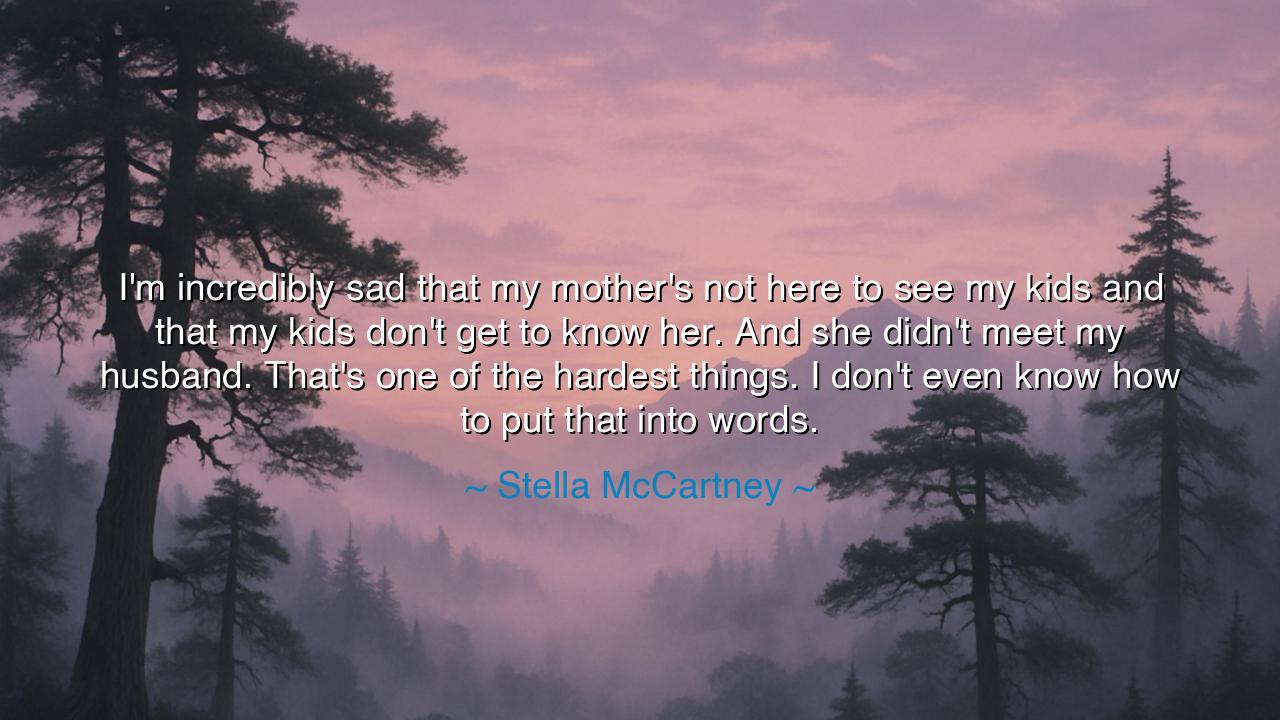
I'm incredibly sad that my mother's not here to see my kids and
I'm incredibly sad that my mother's not here to see my kids and that my kids don't get to know her. And she didn't meet my husband. That's one of the hardest things. I don't even know how to put that into words.






Stella McCartney, with a heart heavy yet unflinchingly honest, once said: “I’m incredibly sad that my mother’s not here to see my kids and that my kids don’t get to know her. And she didn’t meet my husband. That’s one of the hardest things. I don’t even know how to put that into words.” In these lines, she speaks to one of humanity’s oldest sorrows—the absence of a parent, and the longing for their presence in life’s most sacred milestones. Her words are not merely about loss, but about the echo of love across generations, and the pain when those echoes cannot be heard.
This grief is ancient. In every age, children have mourned not only the death of their parents, but the absence of what might have been. The mother, who gave life, who nurtured, who stood as the first guide, becomes irreplaceable in memory. When she is gone, there is not only sorrow for the past but sorrow for the future—for the weddings she could not attend, for the grandchildren she never embraced, for the family gatherings where her voice is missing. Stella’s words carry this universal weight, made all the more poignant by the love she still feels.
History gives us countless mirrors to this sorrow. Consider Alexander the Great, who, after the death of his father, carried forth his destiny with unmatched fire. Yet though his name became immortal, it is said he still longed for the counsel of his mother Olympias, whose fierce love and ambition shaped him. Or recall the grief of Queen Victoria, who, after losing her beloved Prince Albert, lamented not only his absence from her side but from the lives of their children. These stories remind us: loss is not only the cutting off of a life, but the severing of shared futures.
Stella’s reflection is also about legacy—the kids who will never know their grandmother, and the husband who will never meet the woman who shaped her daughter’s spirit. This is the hidden sorrow of death: it steals not only presence but connection, it robs the living of relationships they might have had. What she struggles to put into words is the unbridgeable gap between what is and what should have been. And yet, even in this ache, her mother’s spirit lingers—living through her, through her children, through the love she carries still.
The deeper meaning here is that grief does not end; it transforms. A daughter becomes a mother herself, and in every gesture of care, in every moment of love, she carries her own mother’s legacy forward. Though Stella’s children may never meet their grandmother, they will know her indirectly—in the values, the compassion, the strength their mother embodies. In this way, absence is never total; love reverberates across time, even when the person is gone.
The lesson for us is both tender and fierce: cherish your parents while they walk with you. Speak your gratitude, share your moments, let them know the depth of your love. And if they are gone, carry their memory into your daily life. Tell their stories to your children, share their wisdom with your companions, let their spirit live not as shadow but as light that guides. For though death ends a life, it does not end a bond—it merely changes the form in which that bond is kept.
Practically, we must honor the departed by keeping them present. Create traditions that remember them, keep their names alive at the table, pass down their favorite songs, recipes, sayings. Do not silence their memory; speak it often. And let their absence inspire gratitude for those still with you—parents, mentors, friends. For one day, they too will be gone, and the love you show now will become the inheritance your children carry forward.
Thus Stella McCartney’s words are more than personal lament—they are a timeless teaching on grief, love, and legacy. She shows us that to lose a mother is to lose both anchor and compass, yet also to inherit the sacred task of carrying her light onward. May we, too, honor those we have lost, not by burying their memory in silence, but by weaving it into the very fabric of our lives, so that even absent, they continue to shape the generations yet to come.






AAdministratorAdministrator
Welcome, honored guests. Please leave a comment, we will respond soon